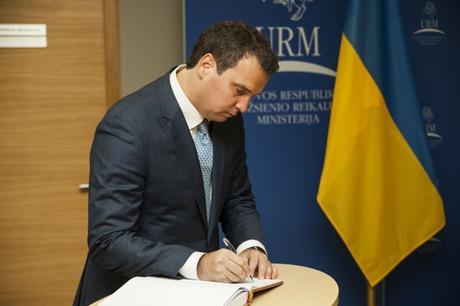
Photo credit: Lithuania Ministry of Foreign Affairs, Flickr
By Eric Hontz and Marc Schleifer
In a stunning announcement in Kyiv on February 3, Ukraine’s Minister of Economic Development and Trade Aivaras Abromavicius submitted his resignation to President Poroshenko). The Lithuanian-born Abromavicius cited several factors contributing to his resignation, including pressure to appoint questionable individuals to his team or to key positions in state-owned enterprises. In particular, he named Igor Kononenko, considered a Poroshenko ally in parliament. President Poroshenko has reportedly urged Minister Abromavicius to stay on, and has promised that the National Anti-Corruption Bureau would investigate his claims against Kononeko.
A public statement signed by10 ambassadors to Ukraine, including from the United States, the United Kingdom, Germany, and France, released hours after the resignation, emphasized deep disappointment and noted the importance of Ukraine’s leaders setting aside parochial differences and the necessity of putting the vested interests that have hindered progress for decades in the past. Minister Abromavicius had gotten several key elements of deregulation and economic reform moving during his time in the Ministry. He and his staff were encouraged by the International Monetary Fund, the European Union, and other leaders to institute far reaching reforms, including the transparent privatization of thousands of state-owned enterprises that weigh down Ukraine’s budget. Specifically, Minister Abromavicius sought to undertake reforms in state-owned enterprises to ensure transparency, impose corporate governance standards, and enlist professional managers in an effort to restrain rent seeking and back-channel arrangements that enriched a politically-chosen few, while depriving Ukraine of valuable budget income and distorting local economies. In his resignation letter, Minister Abromavicius noted that losses in state-owned enterprises were 100 billion hryvnias less in 2015 than in 2014.
At the same time, for the past several months, many of CIPE’s partners in the small and medium-sized enterprise (SME) sector in Ukraine have complained of the slow pace of reform, particularly in terms of fighting corruption and installing a clean judiciary, among other factors. The business community had been broadly supportive of the Minister’s agenda but felt that more could be done. Minister Abromavicius and his staff hold decades of experience in investment banking and asset management, yet the highly-qualified team still hit road blocks to reform so great that they have been forced to resign.
The resignation shines a light on challenges facing this important Ministry for Ukraine’s reform effort. Abromavicius is the second Economic Development Minster to step down following the EuroMaidan two years ago; his predecessor, Pavlo Sheremeta, lasted just six months, from February to August of 2014. In the past year, the Ministry has been restructured several times and has faced numerous staff layoffs. Moreover, a range of key deputy ministers also announced that they would leave, including Yulia Klymenko, who covered SME issues and entrepreneurship development. Many of CIPE’s partners have stressed that the Economic Development and Trade Ministry’s Department of Entrepreneurship Development and Regulatory Policycould have done more to support SMEs, such as approving a national plan for SME development.
The resignation has also touched off a storm of political intrigue and turmoil in Ukraine, as former Georgian President, now Governor of Ukraine’s Odesa region, Mikheil Saakashvili voiced his support for Minister Abromavicius, saying that he too has clashed with corrupt forces in Ukraine. There is now open speculation in Kyiv on a range of topics including how Saakashvili might be aiming to create a new political party; he is growing his own popularity by traveling around the country hosting anti-corruption fora and criticizing the government Prime Minister Yatseniuk. Some say Saakashvili has an eye on becoming the country’s Prime Minister; that he has the support of Sheremeta, and wants to recruit Abromavicius to join him for a run in rumored snap parliamentary elections later this year. Even before Abromavicius stepped down, the “Samopomoch” party pulled one of its members of the government, Agriculture Minister Aleksei Pavlenko. Last year, another Deputy Economic Development Minister, Alexander Borovik, who had extensive private sector experience, left his post to join Saakashvili’s team, but has now reportedly joined the “Power of the People” party, a new economically-liberal bloc. This kind of political speculation is a further blow for the country’s stability, at a time when its economy is slowly starting to turn around, but it is still dealing with an ongoing military conflict with Russia in the East.
Minister Abromavicius’ resignation brings up uncomfortable questions for both the international donor community and the Ukrainian people, serving to highlight the difficulty of enacting meaningful, market-oriented economic reform and reducing corruption in Ukraine, Eurasia, and emerging markets more generally. The European Union, the United States and Ukrainians themselves have invested immeasurable time and energy in supporting reforms, some of which have been painful and burdensome for the average households (and therefore deeply unpopular).
What happens next with economic reform in Ukraine will likely influence the economic and political trajectory of Ukraine, as well as its neighbors Moldova and Georgia – which also aspire to make difficult reforms – in the next several years. Importantly, if Ukraine were to backtrack or stall on reforms, it could prove difficult for other countries in the region to follow through on investments toward reform, and would thus embolden entrenched interests and anti-reform voices in the region.
Eric Hontz is a Program Officer for Eurasia and Marc Schleifer is Regional Director for Eurasia and South Asia.

